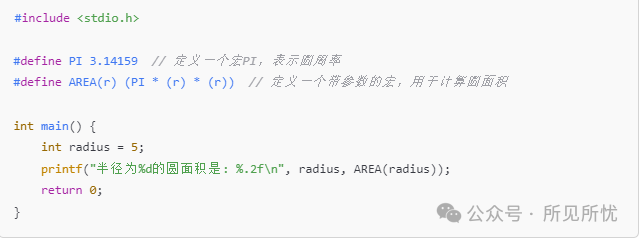Advanced Preprocessor in C Language
Welcome to today’s C language class. The topic we are going to discuss is – the advanced preprocessor in C language. When you hear the word “preprocessor”, do you find it a bit difficult to understand?
In fact, the preprocessor is like a “behind-the-scenes director”. Before the compiler comes into play, it quietly “processes” your code, making your compilation quick and smooth.
So, what exactly can the advanced preprocessor in C language do?
What is the C Language Preprocessor?
Basic Concepts
The C language preprocessor is an important part of the compiler that performs “pre-processing” on the code before the actual compilation of the program. Its work includes:
-
Replacing macro definitions in the code
-
Including other files, such as
<span><span>#include</span></span> -
Conditional compilation, selectively compiling certain parts of the code as needed
Why Is It Important?
Reduce Code Redundancy: By using macro definitions and header files, you can avoid rewriting the same code.
Improve Code Flexibility: Conditional compilation allows your program to adapt to different environments and needs.
In simple terms, the preprocessor is a “magician” that makes your code shorter and more flexible.
Advanced Preprocessor Features and Code Examples
Macro Definition (#define)
Macro definition is the most common function of the preprocessor. It can be used to define a name that represents a value, similar to a “convenient label”.

Code Analysis:
<span><span>#define PI 3.14159</span></span>: When the program sees <span><span>PI</span></span>, it is directly replaced with <span><span>3.14159</span></span>.
<span><span>#define AREA(r) (PI * (r) * (r))</span></span>: This is a parameterized macro, which will be replaced with <span><span>PI * radius * radius</span></span> every time you call <span><span>AREA(radius)</span></span>.
Conditional Compilation (#ifdef / #ifndef / #else / #endif)
Conditional compilation allows you to selectively compile code based on certain conditions.

Code Analysis:
-
<span><span>#ifdef DEBUG</span></span>: Checks if<span><span>DEBUG</span></span>is defined. If it is defined, execute the following code. -
<span><span>#else</span></span>: If<span><span>DEBUG</span></span>is not defined, execute the code here. -
<span><span>#endif</span></span>: Ends conditional compilation.
When running the program, you can switch modes by commenting or uncommenting <span><span>#define DEBUG</span></span>, which is very flexible..
File Inclusion (#include)
The preprocessor can also be used to include external files. This is like preparing all the necessary tools to avoid reinventing the wheel.
Suppose you have a header file <span><span>my_header.h</span></span> with the following content:

When running this code, the program will automatically load the content from <span><span>my_header.h</span></span> as if it were part of the <span><span>main.c</span></span> file.
Common Misconceptions about the Preprocessor
Misconception 1: Misusing Macros
Macros can make the code more concise, but misuse can make the code difficult to maintain, especially with nested macros.

Reminder: To avoid this issue, you can wrap macro parameters with parentheses:

Misconception 2: Duplicate Inclusion of Header Files
If a header file is included multiple times by different files, it may lead to “redefinition” errors. Solution: Use header file guards.

Practical Applications of the Advanced Preprocessor
Cross-Platform Development
Suppose you are developing a cross-platform program, certain features may differ between Windows and Linux platforms. Conditional compilation can help you solve this problem:
Debug Log Control
Conditional compilation can also be used to control the display of debug logs.

Conclusion
The advanced preprocessor in C language may seem simple, but its role in project development is crucial. From reducing code redundancy to enhancing code flexibility, it is an indispensable tool.
By learning about macro definitions, conditional compilation, and file inclusion, you have mastered one of the “behind-the-scenes tools” of the C language..
I hope today’s content helps everyone gain a deeper understanding of the advanced preprocessor in C language. If you encounter other questions during your learning, feel free to leave a message and discuss with me..